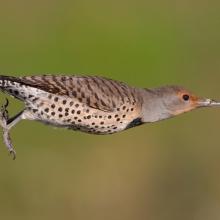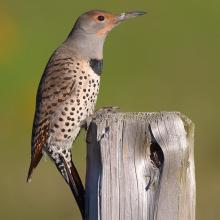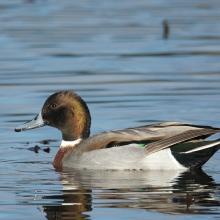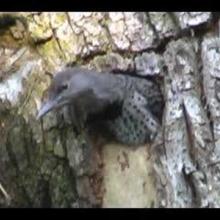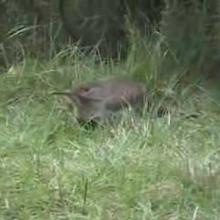

Join BirdNote tomorrow, November 30th!
Illustrator David Sibley and actor H. Jon Benjamin will face off in the bird illustration battle of the century during BirdNote's Year-end Celebration and Auction!
Have you ever watched ducks walking around in freezing temperatures and wondered why their feet don't freeze? And how do birds, including this Northern Flicker, sit on metal perches with no problem? Birds' feet have a miraculous adaptation that keeps them from freezing. Rete mirabile — Latin for "wonderful net" — is a fine, netlike pattern of arteries that interweaves blood from a bird's heart with the veins carrying cold blood from its feet and legs. The system cools the blood so the little blood that goes down to the feet is already cold, so the birds don't lose much heat. The small amount that goes to the feet is likely just enough to keep the feet from freezing.
BirdNote®
Why Birds' Feet Don’t Freeze
Adapted from a script written by Frances Wood
This is BirdNote!
[Mallards quacking]
Have you ever watched ducks walking around in freezing temperatures and wondered how they keep their feet from freezing? The ducks seem oblivious to the cold, even as they stand on ice-covered lakes and streams. Or perhaps you’ve been concerned that the tiny feet of songbirds will freeze to metal perches. [Winter song of Pacific Wren]
Unlike our feet, birds’ feet are little more than bone, sinew, and scale, with very few nerves. But it takes more than a lack of nerves to keep their feet from freezing. An amazing adaptation called rete mirabile is responsible. The arteries that transport blood into the legs lie in contact with the veins that return blood to the bird’s heart. The warm arteries heat the cooler veins. Because the veins also cool the arteries, the bird’s feet are closer to environmental temperature and thus don’t lose as much heat as they would if they were at body temperature.
[More song of songbird]
And those little songbirds’ feet?—don’t worry. Birds’ feet lack sweat glands and stay dry. So, there is no danger of them freezing to metal perches.
What was that called again? Rete mirabile.
For BirdNote, I'm Michael Stein.
###
Call of Mallard and the song of the Winter Wren provided by The Macaulay Library of Natural Sounds at the Cornell Lab of Ornithology, Ithaca, New York. Mallard recorded by A.A. Allen, Winter Wren by G.A. Keller.
BirdNote’s theme music was composed and played by Nancy Rumbel and John Kessler.
Producer: John Kessler
Executive Producer: Chris Peterson
© 2015 Tune In to Nature.org December 2013/2017/2020 / November 2022 Narrator: Michael Stein
ID#121905reteKPLU rete-01c




